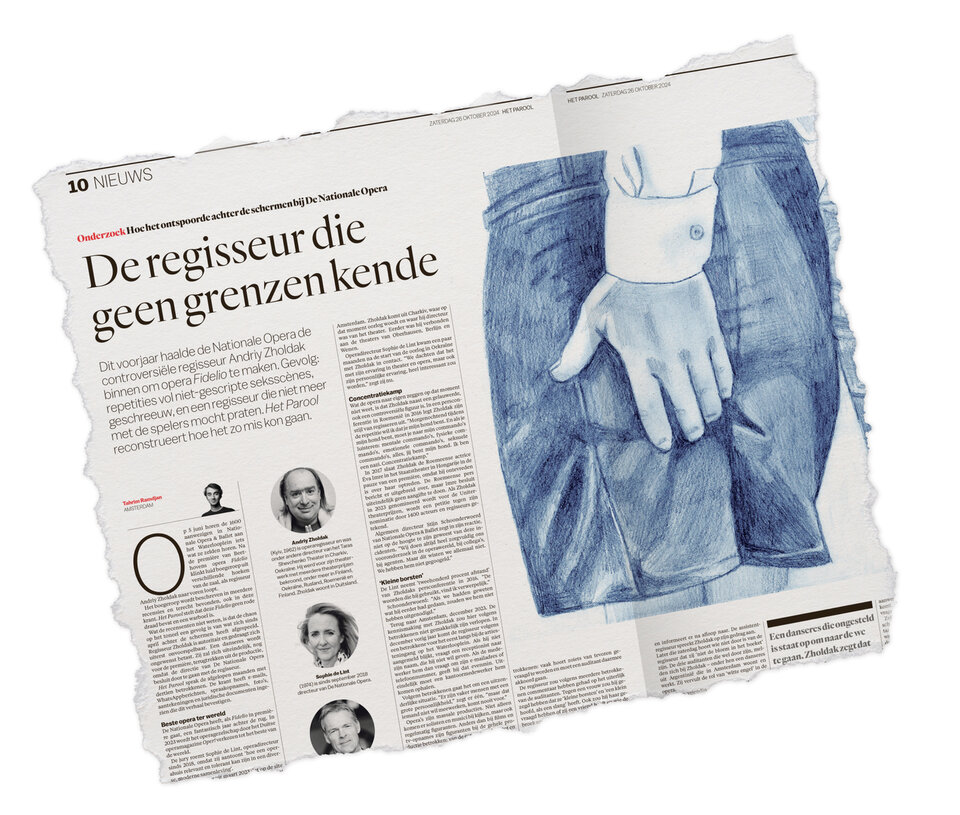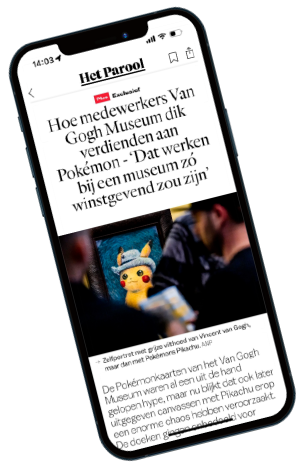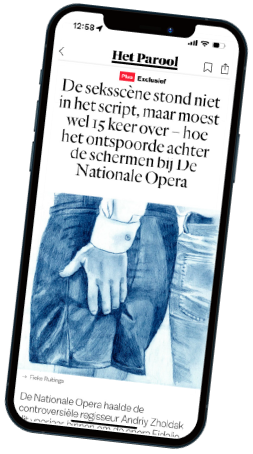
Het Parool Annual Editorial Report 2024
What made last year’s unrest in Amsterdam so challenging to cover, and what stories did the investigative desk break?
Read about the past year
Investigative journalism is a tradition at Het Parool
Het Parool has a long history of investigative journalism, and its readers expect thorough research. We consider it our duty to highlight and investigate developments in the city. That’s why investigative journalism is a fundamental part of who we are.
At the same time, this form of journalism is very labour-intensive, which is sometimes difficult for a relatively small editorial team. In the past, finding time was often a challenge. A new approach enables us to create more space for investigative work: rather than a permanent investigative desk, we operate with a flexible team that includes several investigative journalists. Next to their investigative work, they are also involved in other projects. These investigative journalists often work together, including with colleagues who have little or no experience in investigative reporting, ensuring they receive training as well.
It appears to be working: we have recently published a good number of investigative pieces, almost all about Amsterdam. Including how things went awry behind the scenes at the National Opera, the work culture at the City of Amsterdam, and the sale of Pokémon cards by employees of the Van Gogh Museum. Stories that have brought issues to light and contributed to the public debate.
We can never really get it right
After the Hamas attack in Israel on 7 October 2023 and the subsequent violence in Gaza, tensions also ran high in Amsterdam. The city was divided by grief, anger and protest. Het Parool found itself in the middle of it as the city newspaper.
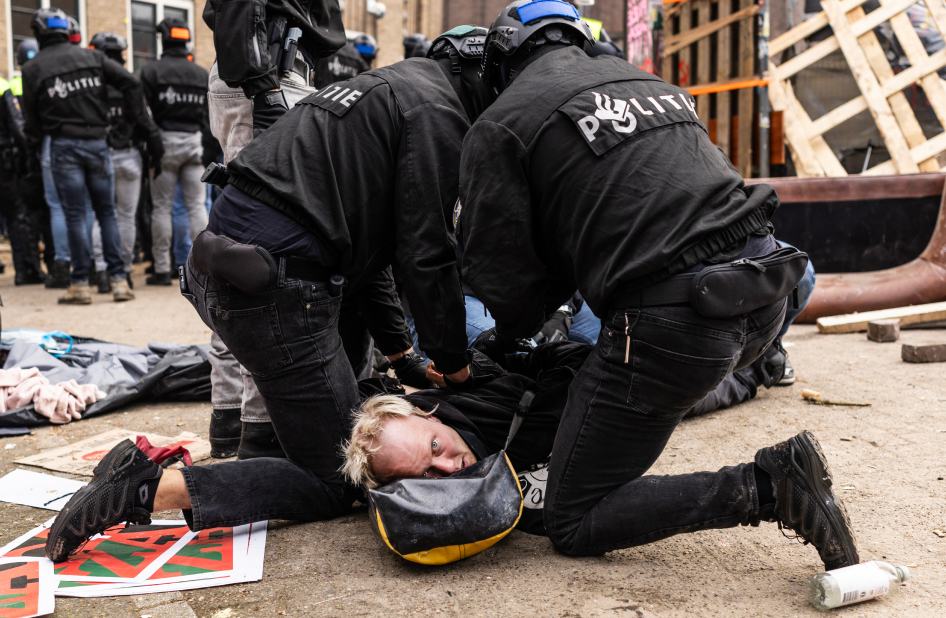
Pro-Palestinian protest at the University of Amsterdam.
After October 7, Amsterdam experienced mourning for the victims of terror and sadness for the hostages, alongside a surge in anti-Semitism, protests against Israel’s actions, anger over those actions, and calls for greater compassion toward the Palestinians. The tensions escalated further due to events surrounding the Ajax – Maccabi Tel Aviv football match in early November 2024, marking a low point.
The city is under immense pressure, with tensions running high and people at times being literally pitted against each other. Our newspaper was tasked with responding to this. This is a tough one, because if there’s one thing we’ve learned, more than a year after October 7, is that we can never really get it right.
The city is under immense pressure, with tensions running high and people at times being literally pitted against each other
One group believes we are giving too little attention to the hostages, while another feels the suffering in Gaza deserves far greater focus. On the one hand, we have a responsibility to report on the rise in anti-Semitism and the growing sense of insecurity among Amsterdam’s Jewish community. On the other, we must also give voice to the concerns of the city’s Palestinian community and their anguish over what is happening to their loved ones in Gaza.
Resistance newspaper
Het Parool was founded during the Second World War as a resistance newspaper. The newspaper stood up against the occupying forces and against the oppression and extermination of Jews. This history determines our identity. Het Parool will always be mindful of the vulnerable position of Jewish Amsterdam residents and the danger of anti-Semitism. At the same time, this identity obliges us to be attentive to every form of racism, discrimination and hatred of populations, such as Muslim hatred. We are mindful of all oppressed groups. That is why it is our journalistic duty to give attention to all sides and to all the pain and sorrow involved.
Because the situation is complex and emotions can escalate quickly, it is essential that we consistently make careful journalistic decisions – considering what we cover, when, how, and why. In the end, even in this case, it comes down to critical and independent journalism, in which we too sometimes make mistakes.
What makes the situation even more complicated is that the unrest in Amsterdam also impacts our journalists and photographers. Protesters on both sides are quick to pass judgement, accusing our journalists of bias and labelling them as either Zionists or Hamas sympathisers. They are sometimes threatened, with their names being posted on social media alongside calls for them to be “kicked out” or “dealt with”.
Kamilla Leupen and Michiel Couzy
Kamilla Leupen
Editor-in-chief Het Parool
Michiel Couzy
Deputy editor-in-chief Het Parool


New media
Podcast in the theatre
In the spring of 2024, three journalists from HetParool took the stage twice before a sold-out crowd at Theater De Meervaart in Amsterdam Osdorp. A total of 1,500 people bought a ticket to see the creators of the ‘Parool Crime Podcast’ live. The evening explored developments in the Amsterdam underworld, offering insights into their work, how it affects them personally, and included time for audience questions. Since then, news editor Corrie Gerritsma, and crime reporters Paul Vugts and Wouter Laumans, have appeared in Leusden and Schiedam, with the year concluding in a sold-out event at Amsterdam’s DeLaMar Theater in December. Invariably, reactions were extremely positive.
The theatre show is a unique example of how journalistic stories can be told in a different way and how a new form attracts a new, younger and more diverse audience to Het Parool. An added bonus is that these innovations provide journalists with opportunities to grow and develop even further.
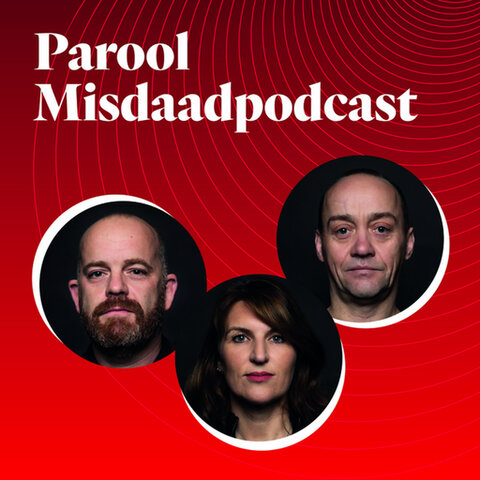
Het Parool in 2024
How high is our daily reach? How many articles do we write in a day and what rating does Het Parool get from its subscribers?
Het Parool, vrij onverveerd
Annual editorial report 2024
Het Parool is part of DPG Media
© 2025 DPG Media B.V. - all rights reserved
